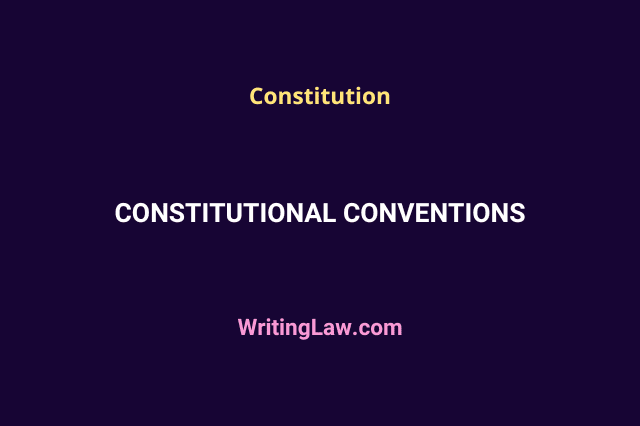
The Constitution of India includes written laws enforced by the courts and unwritten rules required for constitutional government. The unwritten, informal, and uncodified procedural agreements the state’s institutions follow are known as constitutional conventions.
Constitutional conventions cannot be considered laws because neither the courts nor the Houses of Parliament can enforce them. Conventions are constitutional rules that the courts do not implement. When the law remains silent, these conventions play a crucial role.
Further, written rules are followed only in a specific context, while unwritten rules or conventions are applied when the written rule is passive on the issue.
Furthermore, the Constitution of the UK is primarily based on conventions. We in India have a written Constitution but still follow many conventional practices for the smooth functioning of the system. For example, in the appointment of the Chief Justice of India, the senior judge of the Supreme Court becomes the Chief Justice of India. It is nowhere written in the Constitution but is followed as a practice.
Here is an article that covers all about the constitutional conventions.
Definitions of Constitutional Conventions
Here are some definitions of constitutional conventions by popular personalities.
By AV Dicey
Albert Venn Dicey has used the term ‘constitutional convention’ for the first time in his book Introduction to the Study of the Law of the Constitution. Accordingly, AV Dicey believed that the actions of political parties and institutions are administered by two parallel and interrelated sets of rules.
One set of rules is rigorously considered a law because it is a rule that is enforced by the courts (whether written or unwritten, legislated by statute or derived from a mass of tradition, or judge-made maxims).
Conventions, understandings, habits, and practices make up the other set of norms. Though they may govern the acts of the various members of the sovereign power, the ministry, or other officials, they are not actually laws because they are non-enforceable by the courts. This constitutional law segment may be termed the conventions of the Constitution or constitutional morality.
By Austin
According to John Austin, the Constitutional Convention is the “positive morality of the Constitution.”
By Fenwick
Professor Helen Fenwick has defined the constitutional convention as the “non-legal, generally agreed rules about how government should be conducted and, in particular, governing the relations between different organs of government.”
By Peter Hogg
In the words of Peter Hogg, “conventions are rules of the Constitution which the law courts do not enforce. Therefore, they are regarded as non-legal rules. What conventions do is prescribe how legal powers shall be exercised. Some conventions have the effect of transferring effective power from the legal holder to another official or institution. Other conventions limit a broad power or even prescribe that a legal power shall not be exercised.”
Characteristics of Constitutional Convention
The following are the characteristics of the constitutional convention:
- Conventions are defined and implemented by public officials’ non-legal rights, powers, and duties in the three branches of government: Executive, Legislature, and Judiciary — and the relationships between governments and government institutions.
- Constitutional conventions are not regarded as laws because they cannot be enforced by the courts or the Houses of Parliament.
- Conventions or unwritten laws are applied when the written laws legislated by the statute are silent on the matter or where there is no written law/provision related to any particular matter.
- Although constitutional conventions are not the same as rules of law, they can sway the applicability of the rules of law.
Need and Significance of Constitutional Convention
The Constitution of India is a detailed and lengthy document. The constitution-makers have left some matters or issues to be controlled by conventions, which provide constitutional officeholders with some additional authority in such circumstances. The constitutional conventions aim to ensure that the Constitution’s legal framework remains flexible enough to operate according to current constitutional values. Significant constitutional change can be achieved in this manner over time without requiring any fundamental changes to the legislation.
Further, the constitutional conventions function across all branches of government, i.e., the Legislative, the Judicial, and the Executive. Each incorporates a principle of responsible government, not exerting full legal powers or abusing public power and respecting the other government departments’ roles, functions, and duties.
- Understanding the Legislative Branch of the Indian Government - 6th May 2024
- Appointment, Oath, and Removal of Constitutional Posts in India - 28th April 2024
- Powers of Income Tax Authorities in India - 26th April 2024







